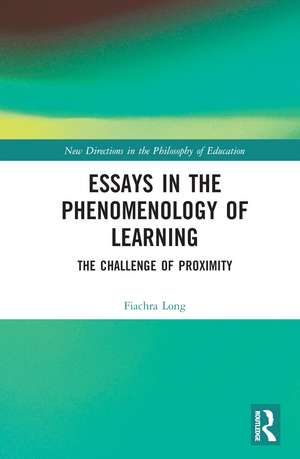Essays in the Phenomenology of Learning: The Challenge of Proximity: New Directions in the Philosophy of Education
Autor Fiachra Longen Limba Engleză Hardback – 26 sep 2022
Studying the power of learning to transform human beings, this book offers an in-depth discussion of how different phenomenologists understand this ‘proximate’ power. It draws on ideas of encounter from Husserl, care from Heidegger, bodily learning from Merleau-Ponty, language from Foucault, omnipotence from Winnicott and recognition from Honneth. The book examines how phenomenological insight can explain the character of radical learning.
The book will appeal to academics and post-graduate students in the fields of philosophy of education, educational psychology, teaching, and learning.
| Toate formatele și edițiile | Preț | Express |
|---|---|---|
| Paperback (1) | 376.37 lei 6-8 săpt. | |
| Taylor & Francis – 27 mai 2024 | 376.37 lei 6-8 săpt. | |
| Hardback (1) | 999.02 lei 6-8 săpt. | |
| Taylor & Francis – 26 sep 2022 | 999.02 lei 6-8 săpt. |
Din seria New Directions in the Philosophy of Education
-
 Preț: 309.38 lei
Preț: 309.38 lei -
 Preț: 335.96 lei
Preț: 335.96 lei -
 Preț: 272.20 lei
Preț: 272.20 lei -
 Preț: 301.48 lei
Preț: 301.48 lei -
 Preț: 334.97 lei
Preț: 334.97 lei -
 Preț: 383.63 lei
Preț: 383.63 lei -
 Preț: 422.59 lei
Preț: 422.59 lei - 17%
 Preț: 253.67 lei
Preț: 253.67 lei - 18%
 Preț: 1002.80 lei
Preț: 1002.80 lei - 18%
 Preț: 1054.75 lei
Preț: 1054.75 lei -
 Preț: 437.71 lei
Preț: 437.71 lei -
 Preț: 400.77 lei
Preț: 400.77 lei -
 Preț: 395.00 lei
Preț: 395.00 lei -
 Preț: 367.46 lei
Preț: 367.46 lei -
 Preț: 448.12 lei
Preț: 448.12 lei - 18%
 Preț: 1000.27 lei
Preț: 1000.27 lei - 17%
 Preț: 259.72 lei
Preț: 259.72 lei -
 Preț: 401.85 lei
Preț: 401.85 lei -
 Preț: 469.07 lei
Preț: 469.07 lei -
 Preț: 402.66 lei
Preț: 402.66 lei -
 Preț: 395.00 lei
Preț: 395.00 lei - 17%
 Preț: 259.98 lei
Preț: 259.98 lei - 26%
 Preț: 820.71 lei
Preț: 820.71 lei - 18%
 Preț: 1161.80 lei
Preț: 1161.80 lei - 18%
 Preț: 998.59 lei
Preț: 998.59 lei -
 Preț: 471.80 lei
Preț: 471.80 lei - 18%
 Preț: 1000.27 lei
Preț: 1000.27 lei - 18%
 Preț: 1217.36 lei
Preț: 1217.36 lei -
 Preț: 478.16 lei
Preț: 478.16 lei -
 Preț: 489.00 lei
Preț: 489.00 lei
Preț: 999.02 lei
Preț vechi: 1218.32 lei
-18% Nou
Puncte Express: 1499
Preț estimativ în valută:
191.16€ • 199.59$ • 158.21£
191.16€ • 199.59$ • 158.21£
Carte tipărită la comandă
Livrare economică 05-19 aprilie
Preluare comenzi: 021 569.72.76
Specificații
ISBN-13: 9781032245744
ISBN-10: 1032245743
Pagini: 202
Dimensiuni: 156 x 234 x 13 mm
Greutate: 0.42 kg
Ediția:1
Editura: Taylor & Francis
Colecția Routledge
Seria New Directions in the Philosophy of Education
Locul publicării:Oxford, United Kingdom
ISBN-10: 1032245743
Pagini: 202
Dimensiuni: 156 x 234 x 13 mm
Greutate: 0.42 kg
Ediția:1
Editura: Taylor & Francis
Colecția Routledge
Seria New Directions in the Philosophy of Education
Locul publicării:Oxford, United Kingdom
Public țintă
PostgraduateNotă biografică
Fiachra Long is retired Senior Lecturer in Education at University College Cork.
Cuprins
Part I: Approaches to proximity. 1. Socrates and the proximity of address. 2. Phenomenology and the proximity of learning. Part II: Phenomenological perspectives. 3. Husserl and the proximity of encounter. 4. Heidegger and the proximity of care. 5. Boredom and the proximity of risk. 6. Merleau-Ponty and the proximity of body. 7. Foucault and the proximity of words. Part III: Fundamental proximity. 8. Winnicott and the proximity of omnipotence. 9. Honneth and the proximity of recognition. Conclusion.
Descriere
This book explores the phenomenology of learning with particular focus on the ‘closeness’ or ‘proximity’ of the knowledge that impacts on learners, young and old.
